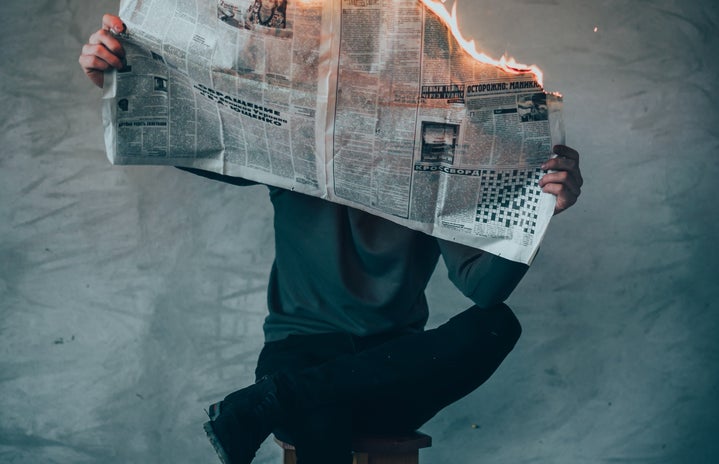The university is a haven of true education. The environment of large-scale libraries, learned professors, and students of diverse backgrounds is very conducive to an exchange of ideas on all aspects of culture, society, and politics; albeit in a safe, secure environment where besides the capability of forming one’s own opinions, the capacity to tolerate those of others is also taught. An Indian student of the humanities is able to understand what the terms democracy and dictatorship, liberalism and conservatism, capitalism and communism (serving as keywords in the ferocious political debates of primetime TV) truly entail.
The university, true to its name, provides an environment where one can truly gain universal knowledge of a variety of disciplines through an analysis of scholarly debates on different socio-political, economic, or natural (scientific) issues. While reading about debates that scholars have had and continue to have on topics like the meaning of feminism; whether a certain invader came to proselytize, rule or loot; whether a certain period can be classified as one of growth or decline and so forth, a student also develops the spirit of debate and discussion. Students learn that every worldly phenomenon can be explained by several contending theories, and adopt a holistic rather than a linear way of thinking. Thus, university education allows students to develop their own opinions rather than sticking to a single school of thought, presented as a ‘fact’ in school textbooks. The thrill of gaining new knowledge and a new worldview is perhaps what leads college students into student politics and activism, or the fight for truth against corruption.
The right to freedom of speech is of utmost value in the university environment. As the topics of debating competitions change from ‘the pros and cons of the virtual world’ to ‘the pros and cons of the AFSPA/ the UAPA’ (both of which, enforced mostly in the insurgency-ridden states of India, provide greater control to the government agencies and law enforcement at the expense of the rights of ordinary citizens), the right to express oneself without the fear of persecution becomes very useful. However, when the same is threatened, the university appears to devolve into school, where the fundamental rights and duties are taught and learned to be regurgitated in exams, not to be absorbed and used to critically analyze the world.
Even a cursory glance at the daily newspapers of the past few years will show the status of freedom of speech and expression in India: essentially the foundation of Indian sovereignty since the culture of peaceful protest was very important in India gaining her freedom. The weight of the growing suppression of dissent by the ruling regime has largely been borne by the media (aka the fourth pillar of Indian democracy). Over the years, a variety of tools have been used to repress opinions critical of the government: arrest for violation of laws (like sedition, defamation, and public incitement), intimidation by governmental agencies, and intimidation by actors that are not directly connected to governance but still exercise great power in Indian society and politics like trolls and peddlers of fake news on social media and self-proclaimed protectors of Indian society and culture (which are really just vigilante groups that function on religious bigotry, sexism, casteism, and xenophobia). The arrests of journalists, income tax raids on independent-news establishments, and online threats of physical harm to dissenters, more uninhibitedly on female journalists, which often get carried into the real world (the most famous examples being the murder of a fact-checking journalist Gauri Lankesh, and the videographed beheading on religious grounds of a civilian who agreed with the bigoted views of a politician on social media), have created an environment of fear and self-censorship amongst the citizens of India and many journalists and news organizations, who if not devolving into sycophancy toward the ruling regime, choose to censor a few words rather than exposing themselves to the potential threat of arrest and trial, or physical harm to themselves or their families. Citizens have turned against citizens based on political ideology in a scenario that is only a few steps short of becoming dystopian, and yet, the vast majority isn’t much concerned by something which doesn’t affect them until they freely voice their opinion on social media or in public, which they are of course prudent enough not to do.
This scenario unfolding outside universities has directly affected the environment behind the closed gates and high walls as students, aware of the precedent set by the tempestuous relationship between the government and the media outside, and the silent fear generated by student political parties functioning inside the campus, have chosen to remain compliant or silent, and turn a blind eye to instances of repression within the campus. The punishment for dissent includes assault (more often by other students than law enforcement), expulsion, or an attempt to control the information they can access (by simply cutting the power, a step which was undertaken in the recent past to keep a whole Indian state compliant and quiet). There are certain words, the use of which in daily debates and discussions, and proposals of students’ conferences, will ensure altercation between students’ political parties. The tag ‘anti-national’ has been liberally used for students in recent years, and even teachers are not protected from this menace. There has been an increasing, if not immediately apparent, attempt to control the academic autonomy of Indian universities, as decisions on the course curriculum and methodology of teaching are increasingly being taken with the ideologies of the ruling party being kept in mind. This means that there is an attempt to directly mold the way students think, and the opinions they form, thus making them more compliant from the get-go.
Students are generally thought of as children incapable of forming the ‘correct’ opinions, and vulnerable to being easily influenced by a certain ideology; this vulnerability of theirs is often cited and used to deride their arguments by those that do not agree with them. An example is the social media chaos that was generated when a student raised her voice against the violence perpetrated by a student political wing in a Delhi University College, from her position as the daughter of a martyred soldier, and a minister replied with, “Who’s polluting this young girl’s mind?”
In the many ways used to reprimand and repress the ‘undisciplined’ students and ridicule their opinions and values, one can see a paternalistic attitude by the administration towards dissenting students (since the same attitude is not seen towards those who follow the ‘correct’ ideology), which one can notice being applied over the whole nation by the administration as well: the banning of the BBC documentary, The Modi Question being a case in point. If the documentary was completely propaganda, biased, and reflective of a ‘colonial mindset’, wouldn’t the educated Indian audiences who watch BBC be able to decide that for themselves? They did not have the opportunity to do so, since it was blocked before it could be watched by the Indian audience, and the latter was shielded from what was alleged to be an inaccurate and politically-motivated portrayal of the Prime Minister.
The repression of students and the media is essentially the censorship of two groups that are the most oriented toward research and fact-finding. Once a culture of self-censorship becomes the norm, there would cease to be a plurality of ideology in a country that most values diversity and plurality. To protect this basic tenet of the Indian Constitution, it is important that we, as students, protect the essential right to freedom of speech for all our peers, in academia or otherwise. As Evelyn Beatrice Hall said of Voltaire’s philosophy in The Friends of Voltaire, “I disapprove of what you say, but I will defend to the death your right to say it”.


